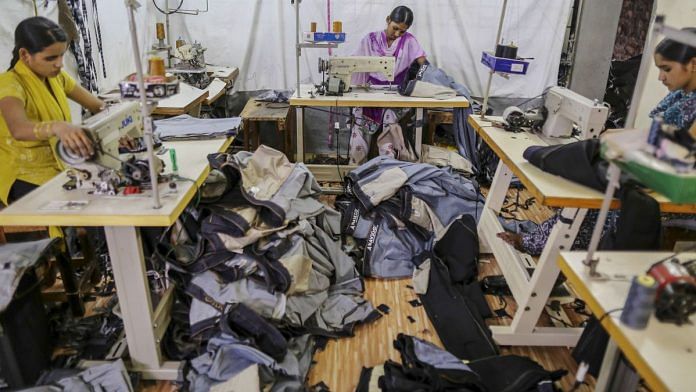In the garment and textile factories of Tamil Nadu and Karnataka, where there is a considerably large female workforce, studies document how managements invoke patriarchal notions of ‘culture’ and morality, and methods of public shaming and sexualized abuse to restrict women workers’ mobility and access to means of communication, and thus deter and prevent women workers from unionizing.
A study of textile factories in Tamil Nadu titled ‘Flawed Fabrics’, exposes a range of exploitative labour practices, including child labour and bonded labour as well as a range of gendered disciplinary measures for women workers. The mills are part of the supply chains for major European and American clothing brands. The hostels for the women workers, which are usually located on the factory grounds, severely restrict autonomy and mobility. Staying in the factory hostel is compulsory for workers who migrate from other districts or villages. ‘Flawed Fabrics’ found that:
At all five investigated mills . . . workers are not allowed to leave the hostel on their own. There is hardly any outside contact . . . Workers may only contact their parents through the hostel phone. Mobile phones are not allowed and afterwork activities are limited. Under the pretext of cultural traditions, girls and women are effectively locked up.
We saw in the third chapter how households and social and political groups confiscate mobile phones and surveil communications of women in the name of protecting them from ‘love jihad’. These globalized factories use the same methods:
If workers want to make a phone call, the warden will check the number they are dialling. The workers may only contact their parents if their number has been given to the warden. Phone calls are always made in the presence of the hostel warden . . . The warden will check the girl workers; where they are going, which shift they are doing.
The things the women workers are scolded for include talking to co-workers (all mills), and talking to male workers (at the Premier, Super and Sulochana mills).
Studies of the neighbouring state of Karnataka also document similar work conditions. ‘Production of Torture: A Study on Working Conditions Including Work Place Harassments Facing Women Garment Workers in Bangalore and Other Districts’, a report by civil liberties and feminist organizations (PUCL, et al), found that here, too, women were prevented from communicating with the outside world: ‘Once workers enter the factories, they are required to be cut off from all contact with the external world, even in case of emergencies.’ The report found that banning workers from carrying mobile phones in the workplace was widespread.
Upon a violation of the rule, some confiscate the mobile phone, others impose a fine, and some others compel the worker to give a written apology and guarantee that she will henceforth not carry the phone into the workplace. Many workers surreptitiously carry their phones into the factory and keep them on a silent mode, as they wish to be contacted at a time of emergency.
As in the Tamil Nadu factories, workers are prohibited from talking to each other:
Since the shop floors are arranged one behind another, it prevents any form of interaction between the workers except during the 15-20 minutes’ lunch break—this prevents any form of cohesion among the workers . . . When not being present at the work stations, workers are consistently questioned about their whereabouts. Even toilet and canteen visits are monitored by security.
Like those used by university and college administrations to justify discriminatory hostel rules for women students, arguments used by the factory management invoke ‘culture’ and parental concerns about ‘safety and security’. For example, responding to a draft version of the ‘Flawed Fabrics’ report, the management of Sulochana mill wrote:
[Because] of our state Tamil Nadu culture and the expectation of girls’ parents, they have been provided accommodation in the hostel of the management. Only for safety and security, the parents and girls decided to stay in the hostel and come for work.
These studies also offer insights into how women themselves can internalize patriarchal ideologies of ‘culture’ and morality. The report describes how women workers, while resenting the ‘prison-like’ conditions, also subscribe to the idea that such restrictions are to be expected for Indian women:
In rural Tamil Nadu, it is generally felt that it is not safe for young unmarried women to stay on their own, in a place where there are no parents, relatives or community members to keep an eye on them. As one of the workers at the Premier mill put it: ‘We are girls; we must follow some values in society.’
Also read: But where will I live? The right to residence of domestic violence victims in India
Humiliation and Harassment as Disciplinary Methods
Studies from both Tamil Nadu and Karnataka document the extreme emotional distress to which women garment workers are subjected. The demeaning, exhausting and exploitative conditions of work, which, in some cases, include humiliating corporal punishments, have made some women workers suicidal.
The ‘Flawed Fabrics’ report records an attempted suicide by a seventeen-year-old worker at Best Corporation’s spinning mill in Dharapuram, one of the units investigated, which was reported in Tamil newspapers on 12 October 2013. The young woman attempted suicide after she was ‘scolded and hit in front of the other workers because she had used a cell phone inside the spinning mill’ and ‘charged a Rs 500 penalty and was forced to clean the wall where the workers spit out’. She could leave the factory premises only after the intervention of a trade union.
The report from Karnataka also documents how women workers are subjected to continuous surveillance and humiliating corporal punishments to pressurize them to meet production targets. The punishments include:
Being scolded in public at the shop floor in the presence of all other workers, or through the public address system . . . Forcibly switching off the machine and being compelled to stand at the shop floor for long in front of other workers . . . Being made to stand outside the work place/gate of the factory for a long period of time for taking leave without prior permission or for reporting for work a few minutes late; When a woman garment worker goes to the toilet, sending someone to follow her to ensure that she does not waste time.
The PUCL report documents how ‘male supervisors, floor in-charges, including managers, call the women workers by abusive names . . . and cast aspersions on their character’. Such ‘scolding’ includes asking the woman worker ‘if she ate food or shit, whether she is a woman who lives on the streets, and asking her why she was late to work’ and so on to suggest that she is a sex worker.17 Such abuse draws on forms of humiliation that are shaped by caste and gender. Cleaning or touching human excreta is associated with the oppressed Dalit castes and forcing people to ‘eat shit’ is a common caste atrocity to which Dalits are subjected. This particular abuse amounts to caste atrocity against a woman worker if she is a Dalit and can also be experienced as demeaning and humiliating by a woman who is not a Dalit. Saying that a woman belongs ‘on the streets’ suggests she is a sex worker— to call a woman a sex worker is to slut-shame her.
The punishments and ‘scoldings’ are designed to be exemplary: their public, performative character enables them to be used to discipline, demoralize and control the entire body of workers, not just the individual worker who is being chastised. The report observes:
A worker is sometimes made to stand aside for an hour as punishment before the assembly. This often reduces the humiliated worker to tears. Equally, this isolation of worker from the assembly of the workers, who look on helplessly and silently, makes all of them feel lost and incapacitated.
Women in the Karnataka factories are frequently subjected to physical violence, ‘including throwing the garment at the worker’s face [most frequently reported by the workers], hitting the woman worker on her back, dragging her out from her workstation, and physically compelling her to stand away from it’. Sexual harassment is also common, including ‘staring hard at a woman worker in a sexual manner; making obscene threats, such as saying that chilli powder will be applied on the woman’s vagina if she does not work efficiently’; as well as ‘scolding’ using sexual expletives.
In the globalized workplace, then, surveillance, sexualized abuse, sexual harassment and public humiliation are not aberrations—these are integral to the production process, and are used to keep the women workers insecure by pressurizing them to meet impossible production targets.
Also read: How Hindustan Unilever became a CEO factory and a company with good middle-class values
The PUCL report notes how the systemic harassment at work keeps women in an emotionally fraught state, given to frequent bouts of weeping, depression, suicidal thoughts, suicide attempts and humiliation at the social shaming associated with garment work.
 This excerpt from Fearless Freedom by Kavita Krishnan has been published with permission from Penguin Random House India.
This excerpt from Fearless Freedom by Kavita Krishnan has been published with permission from Penguin Random House India.



